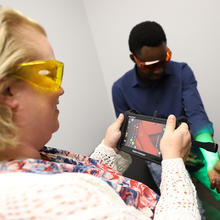- November 4, 2025
Research by George Mason digital technology expert Y. Alicia Hong and obesity expert Larry Cheskin, big data expert Hong Xue, and MS Health Informatics graduate Jo-Vivian Yu found that the eating environments of college students affect their food intake.
- October 29, 2025
WECARE 2.0, a digitally delivered health promotion program for Chinese American dementia caregivers, is easy to use for all literacy levels and increases social supports. An innovative assessment by PhD student Kang Shen highlights that self-report feedback and website activity are crucial for understanding the delivery of a digital intervention.
- October 15, 2025
Digital health researcher Y. Alicia Hong’s WECARE intervention will invigorate resilience in family caregivers of individuals with dementia
- September 26, 2025
Y. Alicia Hong, a digital behavioral health interventionist, will support older adults in honing their digital technology skills. The program, through an interdisciplinary partnership, will pair youth and older adults to practice real-life AI scenarios.
- Groundbreaking mobile app captures and documents bruises to help survivors of interpersonal violenceJune 5, 2025
An interdisciplinary George Mason University research team is breaking new ground in using artificial intelligence to develop a mobile app to accurately capture and document bruises of victims of interpersonal violence.
- December 10, 2024
Researchers Farrokh Alemi and Kevin Lybarger receive George Mason University’s first Patient-Centered Outcomes Research Institute (PCORI) award to develop innovative AI technology, including large language models, for improving antidepressant recommendations.
- November 22, 2024
George Mason University has been awarded funding from the National Institutes of Health through its Artificial Intelligence/Machine Learning Consortium to Advance Health Equity and Researcher Diversity (AIM-AHEAD) program.
- October 10, 2024
A new study from the College of Public Health, led by Professor Janusz Wojtusiak and Health Services Research doctoral candidate Ghaida Alsadah explores the use of machine learning to predict social isolation among caregivers of individuals with Alzheimer’s Disease and related disorders.
- August 14, 2024
Professor John Cantiello reviews the literature to find out who is cheating, how, and how to head it off
- July 8, 2024
Professor Farrokh Alemi receives NIH grant to pilot first-of-its-kind, evidence-based artificial intelligence tool to address the medication needs of Black and African American people with depression. This is part of the college’s Innovate for Good story series.








